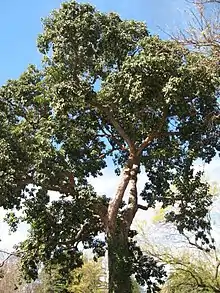Bischofia
Bischofia is a genus of plants in the family Phyllanthaceae first described as a genus in 1827.[2][3] It is native to southern China, the Indian Subcontinent, Queensland, New Guinea, and various islands of the Pacific.[1][4] It is the only member of the tribe Bischofieae. They are dioecious, with male and female flowers on separate plants,[5] but may rarely be monoecious.[6]
| Bischofia | |
|---|---|
 | |
| Bischofia javanica | |
| Scientific classification | |
| Kingdom: | Plantae |
| Clade: | Tracheophytes |
| Clade: | Angiosperms |
| Clade: | Eudicots |
| Clade: | Rosids |
| Order: | Malpighiales |
| Family: | Phyllanthaceae |
| Subfamily: | Antidesmatoideae |
| Tribe: | Bischofieae |
| Genus: | Bischofia Blume |
| Synonyms[1] | |
The genus Bischofia was named after him by Karl Blume.[7]
- species[1]
- Bischofia javanica Blume - S China, Taiwan, Ryukyu Is, Himalayas, India, Bangladesh, Assam, Andaman & Nicobar, Indochina, Malaysia, Indonesia, Philippines, Papuasia, Queensland, Fiji, Niue, Samoa, Tonga, Vanuatu, Cook Is, Society Is
- Bischofia polycarpa (H.Lév.) Airy Shaw - China (Anhui, Fujian, Guangdong, Guangxi, Guizhou, Hunan, Jiangsu, Jiangxi, Shaanxi, Yunnan, Zhejiang)
References
- Kew World Checklist of Selected Plant Families
- Blume, Carl Ludwig von. 1827. Bijdragen tot de flora van Nederlandsch Indië 17: 1168–1169 in Latin
- Tropicos, Bischofia Blume
- Flora of China Vol. 11 Page 217 秋枫属 qiu feng shu Bischofia Blume, Bijdr. 1168. 1826.
- Hoffmann, Petra; Kathriarachchi, Hashendra; Wurdack, Kenneth J. (2006). "A Phylogenetic Classification of Phyllanthaceae (Malpighiales; Euphorbiaceae sensu lato)". Kew Bulletin. 61 (1): 37–53. JSTOR 20443245.
- Wurdack, Kenneth J.; Hoffmann, Petra; Samuel, Rosabelle; Bruijn, Anette; Bank, Michelle; Chase, Mark W. (2004). "Molecular phylogenetic analysis of Phyllanthaceae (Phyllanthoideae pro parte, Euphorbiaceae sensu lato) using plastid RBCL DNA sequences". American Journal of Botany. 91 (11): 1882–1900. doi:10.3732/ajb.91.11.1882. PMID 21652335.
- Quattrocchi, Umberto (2016). CRC World Dictionary of Medicinal and Poisonous Plants: Common Names, Scientific Names, Eponyms, Synonyms, and Etymology. CRC Press. p. 992.
This article is issued from Wikipedia. The text is licensed under Creative Commons - Attribution - Sharealike. Additional terms may apply for the media files.